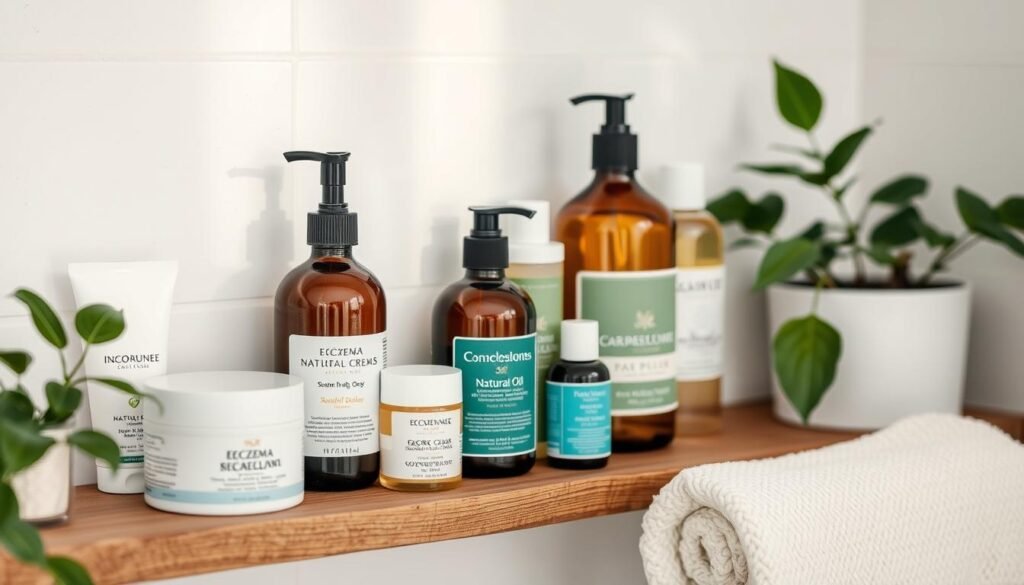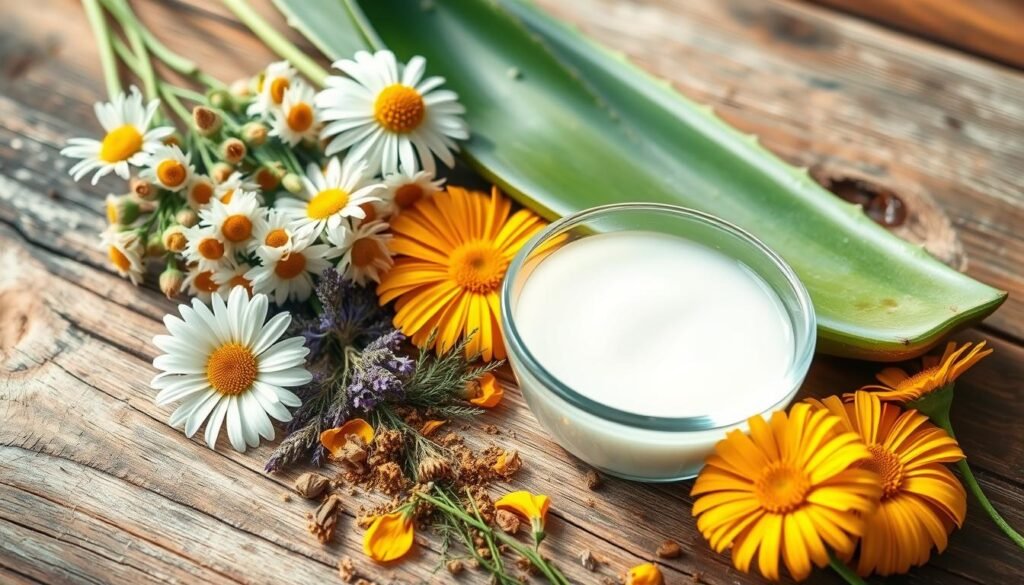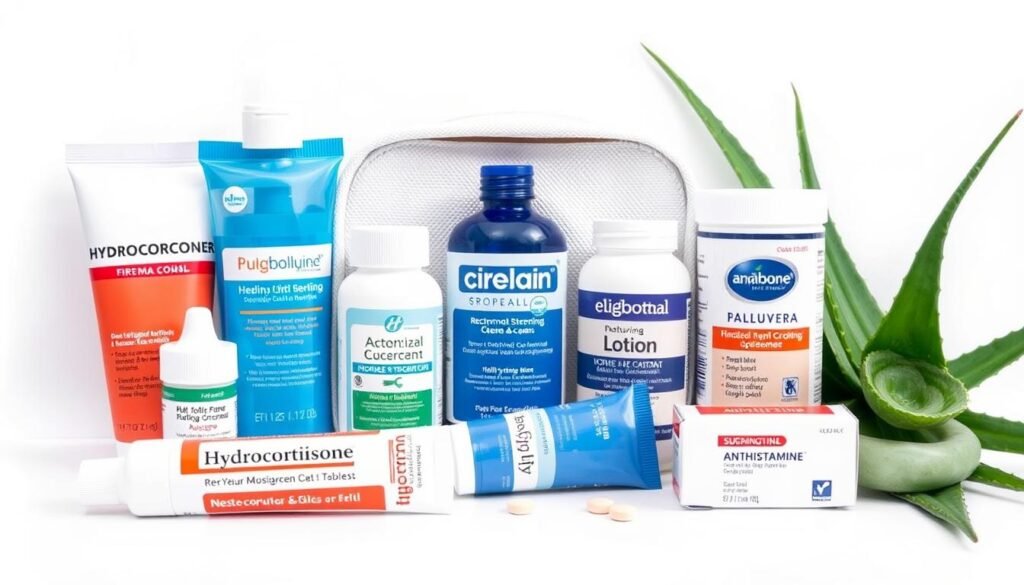Did you know that about 31.6% of people in America have eczema at some time? This skin problem makes skin red and itchy. There’s good news, though. Many treatments you can buy without a prescription help manage it. You can find creams and other items in stores that offer quick relief. This helps your skin get better. Knowing what’s available lets people deal with their skin issues more confidently.
Key Takeaways
- Over-the-Counter Remedies are essential for managing eczema symptoms.
- Topical ointments provide immediate relief for inflamed skin.
- A variety of products are available for effective eczema relief.
- Understanding eczema helps individuals select the right treatments.
- Incorporating self-care practices enhances overall skin health.
Understanding Eczema and Its Symptoms
Eczema is a skin condition that many people face. It comes with eczema symptoms that can cause a lot of discomfort. Individuals might feel an intense itchiness. This often leads them to scratch a lot, which only makes things worse. Their skin might become inflamed showing redness, swelling, and dryness. This can lead to scaly patches that are very upsetting.
There are several kinds of eczema. The most common ones include atopic dermatitis, contact dermatitis, and dyshidrotic eczema. Each type has its own set of challenges and symptoms. This is why it’s key to know exactly what type you’re dealing with for the best care.
Some things can make eczema worse, such as:
- Allergens like pollen, dust mites, and pet dander
- Things in the environment like very hot or cold weather and humidity changes
- Stress and emotional things
Eczema impacts a lot of people, especially kids. They often feel the symptoms more strongly than adults do. This shows why it’s so important to spread the word about eczema. By doing this, we can help people manage it better.
| Type of Eczema | Common Symptoms | Typical Triggers |
|---|---|---|
| Atopic Dermatitis | Itchiness, dry patches, redness | Allergens, weather changes |
| Contact Dermatitis | Rash, irritation, itchiness | Skin contact with irritants |
| Dyshidrotic Eczema | Itchy blisters, dry skin | Stress, humidity |
The Importance of Over-the-Counter Remedies
For those dealing with eczema, Over-the-Counter Remedies are key in daily care. They are found in drug stores, making treatments easy to get without a doctor’s note. This allows people to quickly handle their eczema symptoms, taking control of their skin health.
These non-prescription options are often the first step in easing discomfort. They can stop the itch and cut down on swelling effectively. Products like Cetaphil and Aveeno are geared towards eczema. They offer a variety of choices to fit different needs.
Over-the-Counter Remedies work best with self-care. Adding diet changes, staying hydrated, and moisturizing regularly can boost their power. This full approach helps understand what triggers your skin issues better. It leads to healthier skin overall.
| Over-the-Counter Remedy | Key Benefits | Recommended Brands |
|---|---|---|
| Hydrocortisone Cream | Reduces inflammation and itching | Preparation H, Cortizone 10 |
| Moisturizing Creams | Hydrates skin and prevents dryness | Cetaphil, Eucerin |
| Ointments | Provides longer-lasting moisture | Aveeno, Aquaphor |
Topical Ointments for Eczema Relief
Topical ointments are key in soothing eczema. They can lessen inflammation and comfort the skin. Two types, hydrocortisone and moisturizing creams, uniquely help treat eczema.
Hydrocortisone Creams
For eczema flares, hydrocortisone creams are a top choice. They cut down redness, itching, and swelling. You can find them in different strengths to fit your needs.
Apply them thinly and use sparingly to avoid side effects. Always follow directions from healthcare providers or the label. For more info on eczema treatments, visit this resource.
Moisturizing Creams
Moisturizing creams are vital for keeping skin moist, which helps prevent eczema outbreaks. They use humectants to attract moisture and occlusives to keep it there. Using them regularly builds a moisture barrier against irritation.
Look for creams with glycerin, shea butter, or ceramides to boost skin health. Picking the right one is crucial for managing eczema well.
| Product Type | Function | Active Ingredients |
|---|---|---|
| Hydrocortisone Creams | Reduces inflammation and itching | Hydrocortisone |
| Moisturizing Creams | Hydrates and protects the skin | Glycerin, Shea Butter, Ceramides |
Essential Self-Care Products
Self-care is key in managing eczema. Using the right self-care products can make a big difference in your skin’s health and feel. Adding special bath products and following a daily skin routine can help cut down on flare-ups and soothe sensitive skin.
Bath Additives that Soothe
Bath additives are a must for a soothing bath when you’re dealing with eczema. Colloidal oatmeal and baking soda are very helpful. They calm irritated skin and add moisture. A warm bath with these can lessen itchiness and help you relax.
To get the most out of your bath, try these:
- Colloidal oatmeal: Known for its skin-protective and anti-inflammatory properties.
- Baking soda: Helps in balancing skin pH and reducing irritation.
- Epsom salt: Can help relieve muscle tension while maintaining skin hydration.
Daily Skincare Routines
A good daily skincare routine is vital for strong, comfortable skin. Start with gentle cleansing, then moisturize. Choose cleansers that are mild and free of fragrances to avoid irritation.
For better skincare, do the following:
- Cleanse skin gently with a suitable product.
- Apply a moisturizer right after cleansing to keep moisture in.
- Use special treatments as needed for extra relief.

Drug Store Medications for Eczema
Managing eczema often requires the right drug store medications. Many over-the-counter treatments found in pharmacies can bring relief. For the severe itching, anti-itch products like diphenhydramine are helpful. This antihistamine tackles allergic reactions which might set off eczema and lessens the need to scratch.
It’s important to know how to correctly use these medications. For anything you take by mouth, always check the dose instructions to avoid negative reactions. Though many are safe for everyday use, being well-informed makes them work better for you.
Topical anti-itch products are also valuable. They work well with oral medications by targeting painful spots right away. Creams containing things like menthol offer cooling relief. For trustworthy items, the NEA’s Seal of Acceptance Product Directory is a good place to start.
- Consult a healthcare provider for any unusual symptoms.
- Consider combining treatments for improved relief.
- Read labels for active ingredients to ensure suitability.
Knowing what treatments exist for eczema can really improve life. More info on strong over-the-counter treatments aids in making the best choices.
Herbal Remedies for Natural Relief
Herbal remedies offer a natural way to ease eczema symptoms. They’re important for those wanting to avoid standard treatments. This part talks about top herbal options, their advantages, and safe usage tips.
Popular Herbal Treatments
Many herbal remedies are effective for eczema. Some top ones include:
- Chamomile: It has anti-inflammatory traits to calm the skin.
- Calendula: Helps heal damaged skin with its restorative qualities.
- Aloe Vera: Provides moisture and soothes dry patches.
These herbs are well-liked for their natural eczema relief roles.
How to Use Herbal Remedies Safely
Though herbal solutions offer benefits, safe use is key to prevent harm. Here are some safety tips:
- Always talk to a health expert before trying new treatments.
- Test herbal products on a small skin area to spot any allergies.
- Stick to the suggested amounts and ways to apply them to be safe.
Following these steps helps get the most from herbal eczema treatments safely.

Non-Prescription Treatments: What to Look For
When you need relief from eczema, it’s key to know what to pick. Look for active ingredients that can tackle the issue. Ceramides, glycerin, and items that stop the itch can really help. They make your skin’s barrier stronger and keep moisture in.
It helps to read the *labeling* on these products. Check for anything that might irritate your skin more. It’s important because every product is different. You want something tested by skin doctors and proven in studies.
Here are some brands that do a great job with skin care:
| Brand | Active Ingredients | Features |
|---|---|---|
| CeraVe | Ceramides, Glycerin | Restores and maintains protective skin barrier |
| Vanicream | Inactive ingredients | Free from common irritants such as dyes and fragrance |
| Aveeno | Colloidal Oatmeal | Soothes and calms irritated skin |
Choosing wisely helps in managing eczema with non-prescription methods. For in-depth advice on skin care and medicines, MedlinePlus has lots of info.
First Aid Supplies for Managing Eczema Flare-Ups
Having the right first aid kit is key for dealing with eczema effectively. A kit ready to go can help greatly when skin irritation happens. Make sure to have these items in your kit:
- Bandages to cover irritated skin
- Anti-bacterial ointments to prevent infections
- Topical anesthetics to soothe discomfort
- Moisturizers specifically designed for eczema treatment essentials
These items will relieve symptoms and protect skin from more harm. Knowing how to use these supplies is vital for managing flare-ups well. An eczema essentials checklist can make this easier for some people.
Watching how your skin reacts to various treatments is important. If your condition doesn’t improve or gets worse, it’s time to see a professional. They can provide tailored advice for better skin health.
| First Aid Supply | Purpose | Examples |
|---|---|---|
| Bandages | Protect irritated skin from external factors | Adhesive bandages, gauze pads |
| Anti-bacterial Ointments | Prevent potential infections in broken skin | Neosporin, Bacitracin |
| Topical Anesthetics | Soothe itching and discomfort | Pramoxine cream |
| Moisturizers | Hydrate and protect the skin barrier | Cerave, Eucerin |

Building your own first aid kit for eczema puts you in charge of your condition. For advice on finding the best treatments, visit this resource.
Managing Itching with Over-the-Counter Solutions
Itching from eczema is very uncomfortable. Thankfully, over-the-counter solutions exist to help. These options are made to lessen the itchiness. Knowing about them helps people pick what’s best for them.
Calamine lotion is a go-to for many. It soothes the skin by forming a protective layer. Then, there are creams with menthol. They cool down the skin and dull the itchy feeling for a while.
Topical analgesics are also useful. They work by stopping the brain from getting pain messages. This cuts down the itching feeling. For really bad itches, using a mix of these itch relief products might work best.
For more detail on these options, here’s a table comparing them:
| Product Name | Type | Main Ingredients | Benefits |
|---|---|---|---|
| Calamine Lotion | Topical Solution | Calamine | Soothes irritation, reduces redness |
| Cortisone Cream | Cream | Hydrocortisone | Reduces inflammation, relieves itch |
| Menthol Cream | Topical Cream | Menthol | Provides cooling relief, numbs itching |
| Topical Analgesic | Cream/Ointment | Lidocaine | Interrupts pain signals, reduces discomfort |
Conclusion
Managing eczema well means knowing a lot about it. This includes the right over-the-counter treatments. It’s important to know what causes eczema and its symptoms. This helps people find relief and keep their skin healthy. Using the right products correctly can make a big difference.
Choosing the best treatments is only one part of dealing with eczema. Caring for yourself regularly is also key. Things like sticking to a skin care routine and using gentle bath products help. When people learn and choose wisely, they build a good base to fight eczema.
With the right tools and info, controlling eczema is possible. It’s important to use drugs safely. To learn more about safe medicine use, check out this study. By being dedicated and careful, anyone can manage their eczema. This leads to healthier skin.